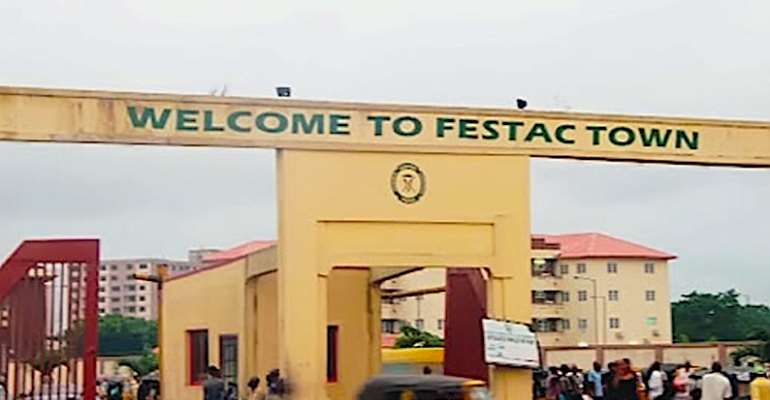Festac Town: A Neighborhood At The Mercy Of Bad Roads

It is not an exaggeration to say that Festac town was built in 1977 on the initiative of the Federal Government of Nigeria, to host around 45.000 visitors along with civil servants moving to the city during the celebration of the Second World Black and African Festival of Arts and Culture (FESTAC), which gave impetus for the coinage of the town’s name.
Given the circumstances that informed the building of Festac town, its image had to evoke modernity and it was equipped with all the necessary infrastructures and services. At the conclusion of the festival, the Federal Government of Nigeria allocated the housing and landed properties to eventual winners who participated in a ballot. Initial regulations prohibited such winners from renting and disposing off the properties to third parties.
But alas! There is no denying the fact that the purpose that informed the creation of the festival town has being defeated, particularly by bad roads and streets that run across its length and breadth, even as its peace is by each passing day been blighted by incessant criminals.
Without any iota of exaggeration, Festac town is one of the oldest planned communities in Nigeria. At the time it was built and commissioned, it was unarguably a prototypical residential estate. It was the first of its kind on the shores of Africa. Festac town, then, boasted of topnotch social and public infrastructures. Most nostalgic about the town, it was highlighted by efficient public transportation and an excellent road network. Without doubt, it was indeed a choice residential location in Nigeria in its early years.
Sadly, today, most of the one-time excellent infrastructure in Festac town have collapsed or enormously deteriorated. For instance, the expansive road networks in Festac are in dilapidated state, despite its management and maintenance being placed under the care of the Federal Housing Authority (FHA). However, the Federal, State and Local Government have literarily been scrambling for the management of the estate. In fact, this multiple claim to its management and maintenance seemingly has surreptitious claim to its ownership, and more often than not cause more harm than good to the residents as various charges ranging from valuation fees, local government levies to tenement rates are collected from them. The battle for the control of Festac Town has lingered on between the Federal government and the Lagos State and to the detriment of the residents of the Estate.
Today, Festac suffers from a terrific neglect by the governments. There are no functional infrastructure. In fact, public infrastructure that still exist are in tumbledown conditions. Reiteratively put, the roads and streets are in dilapidated condition more than other infrastructural facilities that exist in the expansive estate.
Indeed, driving on the roads in Festac has always been unpleasant, particularly as most of the roads are bumpy’ no thanks to crater-sized potholes, floods; mostly after torrential or drizzled rainfall.
Be that as it may, despite the bad state of the roads, the Lagos State Public Works Corporation (LSPWC) in January this year, said it rehabilitated 524 roads in 2021 and was targeting rehabilitation of additional 600 in 2022.
It would be recalled that the spokesman of the corporation, Mr Samuel Ayetutu made the disclosure in an interview where he added that over 1,000 roads were fixed between June 2019 and December 2021.
Ayetutu said various categories of major and minor rehabilitation works were carried out on 524 roads, fixed in 2021 alone, adding that, the corporation has a target to fix 600 in 2022.
Given the foregoing claim, not few residents of Festac are wondering why roads and streets in the town were not captured in the much-talked about rehabilitation exercise.
At this juncture, it is expedient to say that in as much as the State Government has an unrelenting efforts to improve the quality of life of Lagosians that Festac should also be best captured in the massive rehabilitation of roads, traffic management, provision of alternative means of transportation which the government is known for, particularly under the government of Governor Babajide Sanwo-Olu.
The hope of Festac is particularly hinged on the fact that during the media parley mentioned above, Ayetutu assured that strategic roads were important long stretches linking communities, adjoining major roads and used to disperse traffic from major carriageways, constructed almost from scratch to finish.
“Our target for 2022 is to surpass the number of roads that were done in 2021, so we are looking at 600 roads in the minimum to be worked on.
“It will still follow the same pattern of sectional rehabilitation, full rehabilitation, strategic roads, internal roads, estate roads and others,” he said.
He said the corporation was able to deal with challenges of wet season repairs by using cold asphalt and interlocking paving stones.
Against the tone of his speech, and the assured sanguinity with which he spoke, permit me to through this medium urge the State Government to capture roads and streets in Festac in the planned rehabilitation exercise, and even if it is not responsible for the maintenance of the town, one salient fact remains that it is located in Lagos State, and resided by Lagosians, even as the roads that traverse the town are interlinked to other communities where the state’s responsibilities are well spelt out.
Sandra Ijeoma Okoye (Author)

